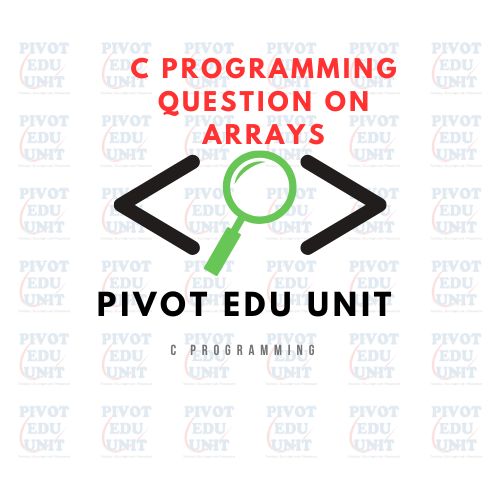WAP in C to print the series 1,2,3,4,5,…………………………n using while loop
#include <stdio.h>
int main() {
int n, i;
// Get the value of 'n' from the user
printf("Enter the value of n: ");
scanf("%d", &n);
// Print the series using a while loop
i = 1;
while (i <= n) {
printf("%d ", i);
i++;
}
return 0;
}
WAP in C to print the series n,n-1,n-2……………3,2,1 using while loop
#include <stdio.h>
int main() {
int n;
// Get the value of 'n' from the user
printf("Enter the value of n: ");
scanf("%d", &n);
// Print the series using a while loop
while (n >= 1) {
printf("%d ", n);
n--;
}
return 0;
}
WAP in C to print all the even numbers between 1 to n using while loop
#include <stdio.h>
int main() {
int n;
// Get the value of 'n' from the user
printf("Enter the value of n: ");
scanf("%d", &n);
// Print even numbers using a while loop
int i = 1;
while (i <= n) {
if (i % 2 == 0) {
printf("%d ", i);
}
i++;
}
return 0;
}
WAP in C to print all the odd numbers between 1 to n using while loop
#include <stdio.h>
int main() {
int n;
// Get the value of 'n' from the user
printf("Enter the value of n: ");
scanf("%d", &n);
// Print odd numbers using a while loop
int i = 1;
while (i <= n) {
if (i % 2 != 0) {
printf("%d ", i);
}
i++;
}
return 0;
}
WAP in C to print the following series 1,4,7,10,……………. to n using while loop
#include <stdio.h>
int main() {
int n;
// Get the value of 'n' from the user
printf("Enter the value of n: ");
scanf("%d", &n);
// Print the series using a while loop
int i = 1;
while (i <= n) {
printf("%d ", i);
i += 3; // Increment by 3 to get the next term in the series
}
return 0;
}
WAP in C to print the following series 1,5, 9, 13, … up to n using while loop
#include <stdio.h>
int main() {
int n;
// Get the value of 'n' from the user
printf("Enter the value of n: ");
scanf("%d", &n);
// Print the series using a while loop
int i = 1;
while (i <= n) {
printf("%d ", i);
i += 4; // Increment by 4 to get the next term in the series
}
return 0;
}
WAP in C to print the following series 2, 6, 10, 14, … up to n using while loop
#include <stdio.h>
int main() {
int n;
// Get the value of 'n' from the user
printf("Enter the value of n: ");
scanf("%d", &n);
// Print the series using a while loop
int i = 2;
while (i <= n) {
printf("%d ", i);
i += 4; // Increment by 4 to get the next term in the series
}
return 0;
}
WAP in C to find sum of all the even numbers between 1 to n using while loop
#include <stdio.h>
int main() {
int n;
// Get the value of 'n' from the user
printf("Enter the value of n: ");
scanf("%d", &n);
int i = 2; // Start from the first even number
int sum = 0;
// Use a while loop to iterate through even numbers up to 'n'
while (i <= n) {
sum += i;
i += 2; // Increment by 2 to get the next even number
}
// Print the sum
printf("Sum of even numbers between 1 and %d: %d\n", n, sum);
return 0;
}
WAP in C to find sum of all the odd numbers between 1 to n using while loop
#include <stdio.h>
int main() {
int n;
// Get the value of 'n' from the user
printf("Enter the value of n: ");
scanf("%d", &n);
int i = 1; // Start from the first odd number
int sum = 0;
// Use a while loop to iterate through odd numbers up to 'n'
while (i <= n) {
sum += i;
i += 2; // Increment by 2 to get the next odd number
}
// Print the sum
printf("Sum of odd numbers between 1 and %d: %d\n", n, sum);
return 0;
}
WAP in C to print multilication table of any number using while loop
#include <stdio.h>
int main() {
int number;
// Get the number for the multiplication table from the user
printf("Enter the number for the multiplication table: ");
scanf("%d", &number);
int i = 1;
// Use a while loop to print the multiplication table
while (i <= 10) {
printf("%d x %d = %d\n", number, i, number * i);
i++;
}
return 0;
}
WAP in C to input a number from user and count the number of digits in the number using while loop
#include <stdio.h>
int main() {
int number;
// Get the number from the user
printf("Enter a number: ");
scanf("%d", &number);
// Initialize the digit count to 0
int digitCount = 0;
// Use a while loop to count the number of digits
while (number != 0) {
number /= 10; // Remove the last digit
digitCount++;
}
// Print the count of digits
printf("Number of digits: %d\n", digitCount);
return 0;
}
WAP in C to input a number from user and reverse the number using while loop
#include <stdio.h>
int main() {
int number, reversedNumber = 0, remainder;
// Get the number from the user
printf("Enter a number: ");
scanf("%d", &number);
// Use a while loop to reverse the number
while (number != 0) {
remainder = number % 10; // Get the last digit
reversedNumber = reversedNumber * 10 + remainder;
number /= 10; // Remove the last digit
}
// Print the reversed number
printf("Reversed Number: %d\n", reversedNumber);
return 0;
}
WAP in C to input a number from user and check wheather the number is Palindrome or not using while loop
#include <stdio.h>
int main() {
int number, originalNumber, reversedNumber = 0, remainder;
// Get the number from the user
printf("Enter a number: ");
scanf("%d", &number);
originalNumber = number; // Save the original number for comparison later
// Use a while loop to reverse the number
while (number != 0) {
remainder = number % 10; // Get the last digit
reversedNumber = reversedNumber * 10 + remainder;
number /= 10; // Remove the last digit
}
// Check if the original number is equal to its reverse
if (originalNumber == reversedNumber) {
printf("The number is a palindrome.\n");
} else {
printf("The number is not a palindrome.\n");
}
return 0;
}
WAP in C to input a number from user and check wheather the number is Armstrong or not using while loop (An Armstrong number is a number that is equal to the sum of its own digits each raised to the power of the number of digits in the number.)
#include <stdio.h>
#include <math.h>
int main() {
int number, originalNumber, digitCount = 0, sum = 0, remainder;
// Get the number from the user
printf("Enter a number: ");
scanf("%d", &number);
originalNumber = number; // Save the original number for comparison later
// Count the number of digits in the number
while (number != 0) {
number /= 10;
digitCount++;
}
number = originalNumber; // Restore the original number
// Use a while loop to check if the number is Armstrong
while (number != 0) {
remainder = number % 10;
sum += pow(remainder, digitCount);
number /= 10;
}
// Check if the original number is equal to the sum of its digits raised to the power of digitCount
if (originalNumber == sum) {
printf("The number is an Armstrong number.\n");
} else {
printf("The number is not an Armstrong number.\n");
}
return 0;
}
WAP in C to input a number from user and check wheather the number is Prime number or not using while loop
#include<stdio.h>
int main() {
int i, n = 2, a, count = 0;
printf("\nEnter the number:");
scanf("%d", &i);
while (n < i) {
if (i % n == 0) {
count++;
}
n++;
}
if (count == 0) {
printf("\nThis number is Prime");
} else {
printf("\nThis number is Not Prime");
}
return 0;
}
WAP in C to input a number from user and find the sum of first and last digit of the number using while loop.
#include <stdio.h>
int main() {
int number, originalNumber, lastDigit, firstDigit, digitCount = 0;
// Get the number from the user
printf("Enter a number: ");
scanf("%d", &number);
originalNumber = number; // Save the original number for later comparison
// Find the last digit
lastDigit = number % 10;
// Count the number of digits in the number
while (number != 0) {
number /= 10;
digitCount++;
}
number = originalNumber; // Restore the original number
// Find the first digit
firstDigit = number / (int)pow(10, digitCount - 1);
// Calculate and print the sum of the first and last digits
printf("Sum of the first and last digits: %d\n", firstDigit + lastDigit);
return 0;
}
WAP in C to input a number from user and count the total even digits from the number using while loop
#include <stdio.h>
int main() {
int number, originalNumber, digit, evenCount = 0;
// Get the number from the user
printf("Enter a number: ");
scanf("%d", &number);
originalNumber = number; // Save the original number for later comparison
// Use a while loop to iterate through each digit
while (number != 0) {
digit = number % 10; // Get the last digit
if (digit % 2 == 0) {
evenCount++;
}
number /= 10; // Remove the last digit
}
// Print the count of even digits
printf("Total even digits in %d: %d\n", originalNumber, evenCount);
return 0;
}
WAP in C to input a number from user and find all prime factors of the number using while loop.
#include <stdio.h>
int main() {
int number, divisor = 2;
// Get the number from the user
printf("Enter a number: ");
scanf("%d", &number);
printf("Prime factors of %d are: ", number);
// Use a while loop to find prime factors
while (number > 1) {
while (number % divisor == 0) {
printf("%d ", divisor);
number /= divisor;
}
divisor++;
}
printf("\n");
return 0;
}




